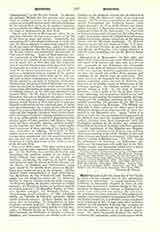

Midwives, come under the canon law of the Church in their relation towards two of the sacraments, baptism and matrimony. As regards marriage, their testimony is frequently required in cases de non consummato matrimonio, whether owing to the impediment of impotency or because a dispensation is asked super matrimonio rato tantum. In such cases, the testimony of three midwives is held sufficient in practice, since the number seven mentioned in the “Corpus Juris Canonici” (c. 4, de Probat.) is not considered to be obligatory in law, though some older canonises insisted on the necessity of having the testimony of ‘seven midwives. As regards the sacrament of baptism the office of midwives is of the highest importance. On them frequently devolves the duty of conferring this sacrament, under circumstances where no other person’s ministration is possible. Hence, the Church has always been most solicitous concerning the character of midwives and their instruction in this religious duty. Canonists teach that women who undertake the office of midwife are bound under mortal sin to learn the methods and requirements of valid baptism, as in ease of necessity this duty frequently devolves upon them. There has been much legislation on this subject in various diocesan synods, whose canons place special obligations on parish priests and midwives. The former are reminded that, as midwives in conferring baptism act in place of the parish priest, he is strictly bound to inform himself whether they have sufficient knowledge to administer the sacrament validly. Some diocesan synods require that midwives, before being approved for duty, take an oath that they will labor to procure the spiritual safety of infant and mother. When a newborn child has been baptized by a midwife, the parish priest must inquire carefully whether she had the proper intention and administered the rite according to the prescriptions of the Church. If there is any reason for doubt, the baptism is to be repeated conditionally (Catech. Rom., II, ii, § 43); but if it be certain that the sacrament was properly conferred it may not be repeated (c. Majores, 3 de bapt; Conc. Trid. Sess. VI, can. ix), and only the other ceremonies are to be supplied by the parish priest. Finally, it is likewise necessary that midwives be well informed on the Church‘s teaching concerning the performance of abortion.
WILLIAM H. W. FANNING

